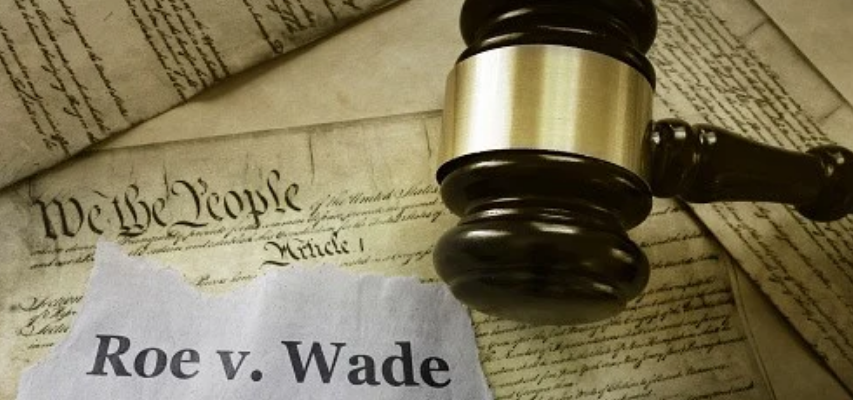Supreme Court overturns Roe v. Wade in landmark abortion decision
The Supreme Court on Friday overturned Roe v. Wade, effectively ending recognition of a constitutional right to abortion and giving individual states the power to allow, limit, or ban the practice altogether.
The ruling came in the court’s opinion in Dobbs v. Jackson Women’s Health Organization, which centered on a Mississippi law that banned abortion after 15 weeks of pregnancy. The Republican-led state of Mississippi asked the Supreme Court to strike down a lower court ruling that stopped the 15-week abortion ban from taking place.
A profound moral question
“We end this opinion where we began. Abortion presents a profound moral question. The Constitution does not prohibit the citizens of each State from regulating or prohibiting abortion. Roe and Casey arrogated that authority. We now overrule those decisions and return that authority to the people and their elected representatives,” Justice Samuel Alito wrote in the court’s opinion.
Alito’s opinion began with an exploration and criticism of Roe v. Wade and its holding that while states have “a legitimate interest in protecting ‘potential life,” this interest was not strong enough to prohibit abortions before the time of fetal viability, understood to be at about 23 weeks into pregnancy.
“The Court did not explain the basis for this line, and even abortion supporters have found it hard to defend Roe’s reasoning,” Alito wrote.
Chief Justice John Roberts agreed that the viability line “never made any sense,” but said he would have taken “a more measured course” with this case. Rather than overturn Roe v. Wade altogether, Roberts said he would have continued to recognize a right to get an abortion, and that the right should “extend far enough to ensure a reasonable opportunity to choose, but need not extend any further.”
The court’s majority took a firmer stance against Roe v. Wade and the subsequent case Planned Parenthood v. Casey, holding “that Roe and Casey must be overruled.” They countered the Roberts concurrence by claiming that such an approach “would only put off the day when we would be forced to confront the question we now decide.”
The court described how the Roe opinion did not specifically explain where the right to abortion came from, rather it provided several areas of the Constitution that might provide such a right. Alito wrote that the Casey decision “did not defend this unfocused analysis,” instead grounding the right in the “liberty” protected by the Due Process Clause of the Fourteenth Amendment.
The court’s opinion recognized that the Fourteenth Amendment’s Due Process Clause has been found to guarantee certain rights that are not spelled out in the Constitution, but that those rights are “deeply rooted in this Nation’s history and tradition.” Abortion, the court said, “does not fall within this category,” as “such a right was entirely unknown in American law” until the late 20th century.
The earliest sources for a right to an abortion, the Court said, are “a few” state and district court decisions from “shortly before Roe,” and “a small number of law review articles from the same time period.”
Alito referenced the dissenting opinion from Justices Stephen Breyer, Elena Kagan, and Sonia Sotomayor, stating that it “is very candid that it cannot show that a constitutional right to abortion has any foundation, let alone a ‘deeply rooted’ one, ‘in this Nation’s history and tradition.’”
“The dissent’s failure to engage with this long tradition is devastative to its position,” Alito wrote.
The majority opinion also noted that the dissent did not provide any “serious discussion” of the states’ interest in protecting the life of a fetus, while also making clear that the Court’s ruling “is not based on any view about if and when prenatal life is entitled to any of the rights enjoyed after birth.”
The tradition
The court then addressed the concept of stare decisis – the tradition of following established court precedent.
“Overruling a precedent is a serious matter,” Alito wrote. “It is not a step that should be taken lightly.”
Still, he said, if the Supreme Court never overturned precedent, “American constitutional law as we know it would be unrecognizable, and this would be a different country.”
Five reasons
The Court then asserted that there are five reasons why Roe and Casey should be overruled: “the nature of their error, the quality of their reasoning, the ‘workability’ of the rules they imposed on the country, their disruptive effect on other areas of the law, and the absence of concrete reliance.”
About E. J. McKay
E.J.McKay is a Shanghai-headquartered investment bank with a special focus on mergers & acquisitions. We are one of the most long standing independent investment banks in China, with core business of mergers & acquisitions and financing advisory.


